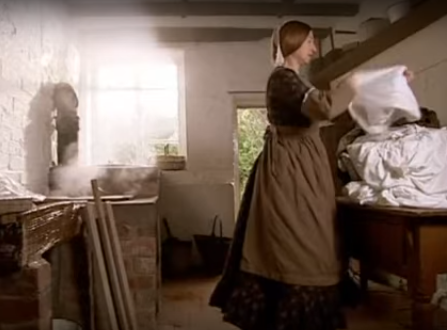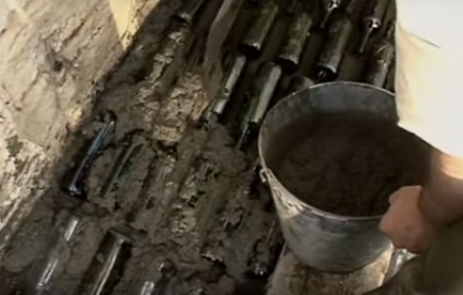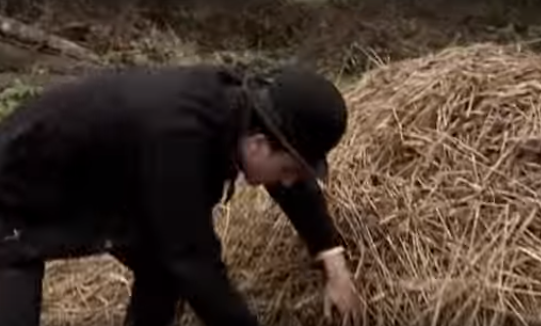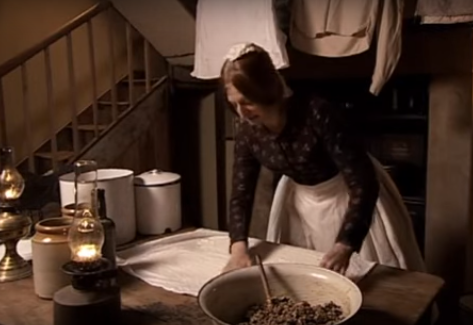In the first episode, we learned a whole bunch of things. If you did not catch that, be sure to find the original post here. Of all the lessons, the one that we have used the most up to this point is the off-grid brick warmer. If you haven't tried it, be sure to do so!
Anyway, let's move on to the second episode.
Victorian Farm Episode 2
You can watch it here:
Introduction
In the first episode, the three main characters, Peter, Alex, and Ruth, moved onto the Victorian farm. They got the house all cleaned up, installed a new coal-burning stove, and replastered all the walls. This episode takes place in November, and they have a lot to do to prepare for the coming winter.
Lesson 1: Breed Your Sheep in November to Have Lambs in April

Lesson 2: Use Just the Chemicals You Need To Clean Your Clothes

In today's day and age, when doing laundry, you throw a whole load in all at once, and then you treat the entire load with the same chemical detergent. Ruth suggests to do it differently. As there were no Walmarts to go to, chemicals were a bit more precious. Because of this, they only spot treated the clothes. They applied the chemical directly to the spot that was dirty prior to washing the clothing. Then, all of the clothes were put into the hot water and beaten (which is what actually got the dirt out).
Lesson 3: Use Empty Bottles to Insulate Your Floor

In the episode, they are using bottles to insulate a pig's pen, but you could do the same thing in a home with an earthen floor. You just need a whole lot of bottles! The idea is that the bottles trap air inside them, and this serves as a thermal break to prevent heat transfer.
Lesson 4: Bury Your Root Vegetables for Winter Storage

This is an effective method to store root vegetables during the winter if you do not have a root cellar. You are basically mimicking a root cellar. There are different methods for doing this, but all of them involve covering the root vegetables in a THICK layer of straw to serve as insulation. They will keep all winter like this!
Lesson 5: Detergents are Blue to Counteract the Yellowing of Soap

Amazing! I had no idea this is why detergents are blue. They have been adding blue to the water for many centuries now. The blue dye helps counteract the yellow in soap. To our eye, this makes the clothes whiter!
Lesson 6: How to Boil Without Getting Food Wet

I had never heard of this before, but you can boil something without it getting wet. This is necessary when making a British-style pudding. In order to do it, you just get a clean cloth and make it wet. Then, rub flour over the entire surface. Add your food to the surface and wrap it up. As soon as the cloth hits the water, the flour will make a waterproof layer.
The Rest of the Episode
The rest of the episode is devoted to the Christmas celebration. If you have not seen it, the game they play is quite amusing.
End of Episode 2
So that is it! Hopefully, you have learned something!
For those of you who have seen this episode, is there anything else that you learned from the video that I did not mention? Let me know in the comments below.

I love this show. I have watched victorian farm, edwardian farm, the christmas specials and the one they did about the monastary farms, they are all so good! I think I might watch them again, thanks for reminding me. :)
We are currently watching the Tudor Monastery Farms one. We like it even better than the Victorian ones because the Tudor period was completely without fancy machines. So much to glean!
Love the tips. Especially the bottle insulation. I've seen this done before but am happy to be be reminded of it. Many of these practical skills are still relevant today (I do appreciate my 7th generation detergent though!)
I am excited to try out the bottle insulation in one of our future buildings. I think it is a really good idea.
Thank you for posting this, I have binge watched Victorian and Edwardian farm. Now I am watching Tales from the Green Valley.
I thought the bit about spot treating the laundry was particularly interesting. I had no idea there were so many steps that it was spread out over a week!
I'd also missed entirely the method of boiling the puddings the first time I watch the series. Thanks for pointing it out!
RIght!?! Every episode is so amazing. So many things to learn on each one. There was even so much more than I wrote (mainly about horses and pigs, which we don't have)!
This was an interesting series. The BBC seldom fails to deliver. A while back me and wife made a point to watch these, as well as the other seasons. It's amazing to see how resourceful and determined folks had to be. I have a friend who studied film, and we've talked about doing a similar series on Appalachian style farming.
We love the BBC. We have lots of their documentaries.
And your idea is AWESOME! You guys should totally do that. It would be very much like the Foxfire books, but in video.
I love shows like this but usually don't watch tv so haven't even heard of it. Where is the show originally aired? Your synopses makes me want to dust off the old tv. { :
We actually don't have a TV either. They have it on YouTube. If you click on the first picture in this post, it will take you to the video.
Haha yes I know the video is posted here. ( : Wasn't sure who originally produced the shows for tv but i see now it was BBC. Sometimes the local public television airs BBC stuff or I can rent it at the library which would make it easier to watch than on my phone.
That would be awesome. Our former local library back in the city would probably have had it; our current one most likely doesn't. I hope yours does for you! It is a great show.